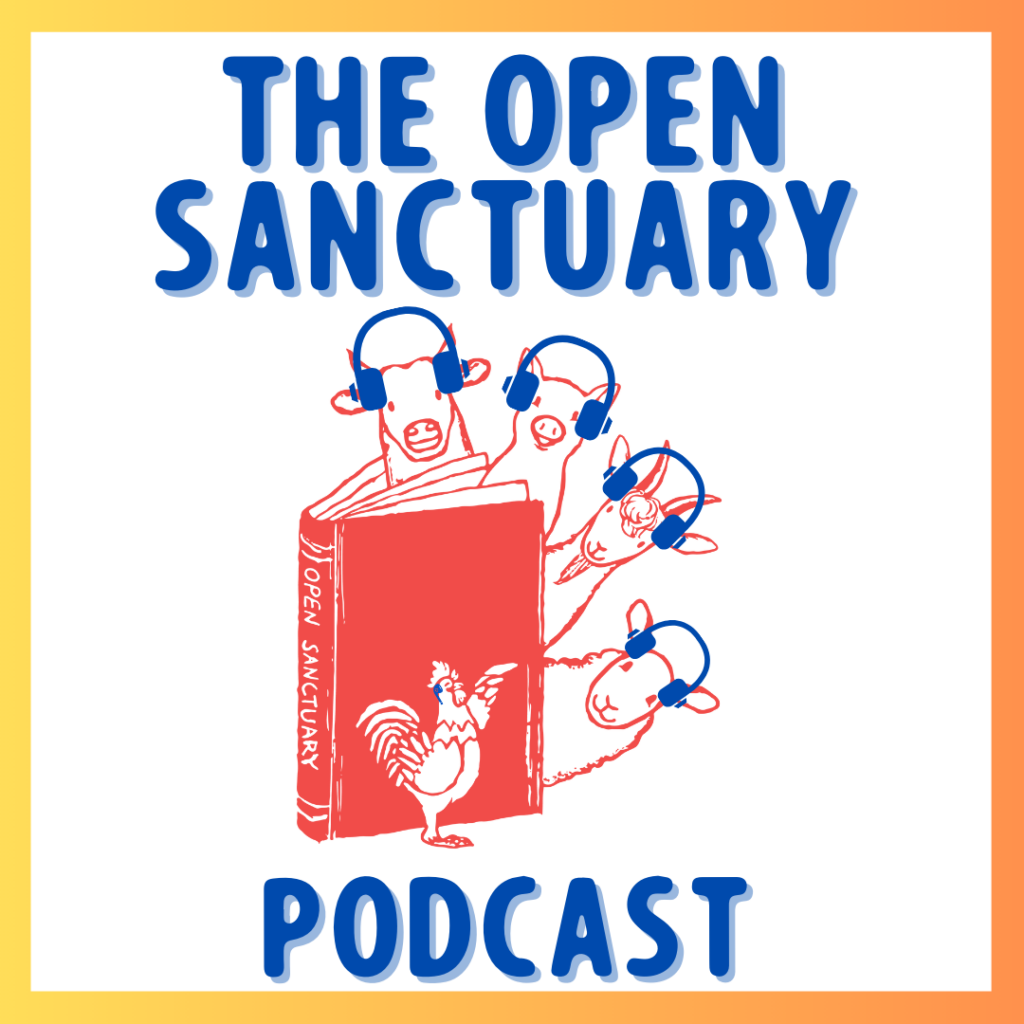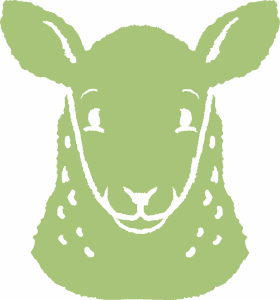
Updated April 8, 2022

We Have A Podcast Episode On This Subject!
Want to learn about this topic in a different format? Check out our episode of The Open Sanctuary Podcast about language choices at sanctuaries here!
Whether your animal sanctuary prides itself in its extensive public visitation programs or your organization operates entirely outside of the public spotlight, intentional language choice is one of the best tools your sanctuary has to advocate for your residents and others like them. Language use has been found to alter our perceptions of the world, both in terms of how we construct our value systems and how we conceptualize solutions to challenges that we face as a society. At a farmed animal sanctuary, in particular, this provides a relatively simple but powerful opportunity to help reframe the way people consider your residents and the billions of farmed animals around the world.
Words Matter
Generally, the language surrounding animal agriculture has been constructed in a way that separates species that are farmed from other domesticated species. For instance, a human eats food, and a typical “companion animal” like a dog or cat also eats food. However, the generally used term for chicken or cow or pig food is feed. There is no purpose for this change in verbiage other than to separate and “otherize” a human’s perception of these species. As their lives are devalued to a purely economic consideration, it has been generally accepted by most that they do not deserve the same language of humans and their companions.
Although we cannot flip a switch to rewire the lexicon of modern society, we do have the power to help people better understand our residents and how we see them by making more inclusive and compassionate language choices. This does not have to be accomplished aggressively or with grand pronouncements; simply creating and gently enforcing an internal policy of preferred language choices for staff, volunteers, and communications can subtly reshape perceptions. This could be implemented as an organizational core values document that includes an overview of your philosophy of language use, or as a list of commonly used phrases and how they could be modified to give greater consideration to your residents. As an example, check out The Open Sanctuary Project’s language policy here.
Here are some language changes that could be encouraged at a farmed animal sanctuary:
| Instead Of | Consider Using | Explanation |
|---|---|---|
| Your Animals | Your Residents or Sanctuary Animals | They live at your sanctuary; creates a baseline of respect for their autonomyThe ability for individuals to have access to free movement, appropriate food, and the ability to reasonably avoid situations they wish to avoid. |
| Farm AnimalsDomesticated animals that are used by humans either for their body or what comes from their body. Farmed animals have fewer regulations governing their welfare than other species in many countries. | Farmed AnimalsA species or specific breed of animal that is raised by humans for the use of their bodies or what comes from their bodies. | Farming has been “done” to these species, it is not an inherent quality of them |
| Domestic | DomesticatedAdapted over time (as by selective breeding) from a wild or natural state to life in close association with and to the benefit of humans | Like farming, domestication was a process “done” to these animals, not an inherent quality. |
| Fish | FishesWhile "fish" is often used to refer to multiple fishes, we use "fishes" to underscore that each fish should be considered as an individual with their own needs, preferences, and abilities, rather than as a monolith consisting of thousands of different species. | Helps underscore that each fish should be considered as an individual. |
| Animals | Non-Human Animals or Non-Human People | Reframes implied dominion |
| The pronoun “it” in reference to a resident | He, She, They | “It” is a depersonalizing pronoun in most cases |
| Feed | Food | Feed is an “otherizing” term |
| Gestation | Pregnancy | Gestation is an “otherizing” term |
| PetAn animal who spends regular time with humans in their home and life for companionship or human pleasure. Typically a small subset of animal species are considered to be pets by the general public. | Companion | Reframes implied dominion |
| “Owner” or “Master” | “Guardian” or “Caregiver” | Reframes implied dominion |
| “Dairy” CowsWhile "cows" can be defined to refer exclusively to female cattle, at The Open Sanctuary Project we refer to domesticated cattle of all ages and sexes as "cows." | Cows used by the dairy industry or for their milk | How animals are used by people should not define them |
| “Meat” or “Broiler” chickens | Chickens used for their flesh or “Large BreedDomesticated animal breeds that have been selectively bred by humans to grow as large as possible, as quickly as possible, to the detriment of their health. Chickens” | How animals are used by people should not define them |
| “Layer” Hens | Chickens used for their eggs | How animals are used by people should not define them |
| “Bachelor flock” | Rooster flock | “Bachelor” reduces roosters to human stereotypes |
|
Meat, specific “types” of meat | Flesh, flesh of a cowWhile "cow" can be defined to refer exclusively to female cattle, at The Open Sanctuary Project we refer to domesticated cattle of all ages and sexes as "cows.", pig, etc. | These terms are often used to obfuscate their origin |
| “Aggressive” Animals | Try to describe their behaviors without assigning a value to the animal | “Aggressive” implies an animal is acting intentionally maliciously, or aggression is in their inherent nature. Learn more here! |
It may seem excessive to consider some of these language changes if you haven’t been exposed to them before, but giving greater consideration to animals has the power to make people see farmed animals in a different light. Perhaps a visitor has never considered or been exposed to the idea of a chicken as an individual with their own preferences, or a cow living on their own terms. Language reframing can help plant the seeds to help people consider the impact of their choices in their day to day lives.
Even if your sanctuary operates on an internal personnel-only basis, maintaining intentional language can help reinforce your values and standards with all staff members and help keep a level of respect between staff and your sanctuary’s residents. Without this persistent culture of respect, it can unfortunately be easy to lose focus of the role of a sanctuary and how it serves its vulnerable population.
Countering “Humanewashing”
Language choice has been manipulated by the animal agricultureThe human production and use of animals in order to produce animal products, typically for profit. industry with great success. Marketers have created extensive campaigns to modify the vocabulary associated with the animal agriculture industry in order to influence the perception of consumers who would like to believe they are doing right by farmed animals. To combat this issue, your sanctuary can provide a resource for visitors that explains the black and white regulatory realities behind “humane” animal agriculture labels such as “cage-free”, “organic”, “free-range”, “grass-fed”, and “local”. These terms have been engineered to imply a higher standard of animal comfort and well-being that does not necessarily reflect the experience of the animals treated under those labels, but most consumers are unaware of these realities. Check out Farm Sanctuary’s resource about this subject here.
It’s A Process
Even with a language policy in place, it’s not going to take long for someone to use a phrase that they’re used to associating with farmed animals, be it a well-meaning visitor, volunteer, or even a veteran staff member! When a less compassionate term is used, especially by a visitor, gently offer an alternative phrase and a non-judgmental explanation. Intentional consideration for animals is typically foreign to most people socialized in a world that devalues animal lives, and it’s unlikely the speaker meant any harmThe infliction of mental, emotional, and/or physical pain, suffering, or loss. Harm can occur intentionally or unintentionally and directly or indirectly. Someone can intentionally cause direct harm (e.g., punitively cutting a sheep's skin while shearing them) or unintentionally cause direct harm (e.g., your hand slips while shearing a sheep, causing an accidental wound on their skin). Likewise, someone can intentionally cause indirect harm (e.g., selling socks made from a sanctuary resident's wool and encouraging folks who purchase them to buy more products made from the wool of farmed sheep) or unintentionally cause indirect harm (e.g., selling socks made from a sanctuary resident's wool, which inadvertently perpetuates the idea that it is ok to commodify sheep for their wool).. Most people (especially those choosing to visit a farmed animal sanctuaryAn animal sanctuary that primarily cares for rescued animals that were farmed by humans.) are open to hearing compassionate explanations for why a sanctuary chooses different terminology. Conversely, most people become more defensive about their beliefs and dismissive to suggestions if they feel shamed or criticized. Visitors are potential allies to your mission, so it’s important to make them feel welcome and curious rather than alienated. We’re all working towards more compassionate treatment of animals, and it’s important to be compassionate to other humans when possible.

This Goes For You, Too!
Yes, you! It can take time to re-establish a mental dictionary after years of using certain phrases, so don’t be too hard on yourself if you mess up on occasion!
Think Carefully About How You Talk About Humans As Well
While you are implementing a language policy at your sanctuary for the animals, it’s also important to implement a respectful language policy for humans as well. You should codify acceptable and inclusive language to make human staff, volunteers, and visitors all feel comfortable at your sanctuary. Let people from all different backgrounds, races, cultures, genders, sexual orientations, regardless of economic, health, and social status, know that they are respected and welcome at your sanctuary and in all of your communications.
When A Sanctuary Talks About Other Social Movements
Although it may seem benign to some, we strongly recommend that any animal-focused organization not utilize language that co-opts or counters that of other social movements. For instance, some sanctuaries have in the past utilized the phrase “All lives matter” in communications. This phrase, while it may sound sensible at first, has significant negative implications and should not be used.
If your organization wishes to build coalitions and promote social initiatives outside of animal-focused work, your show of support is more likely going to be better received by amplifying the messages of other organizations and organizers who primarily focus on that work without promoting other causes. Unintentionally co-opting language to redirect a message to suit your goals, as well-intentioned as these goals may be, will likely be received as callous or possibly in opposition to the aims of the original movement.
SOURCES:
Words Matter | Animal Sheltering
Can Language Influence Our Perception Of Reality? | Slate
Farm Fresh? Natural? Eggs Not Always What They’re Cracked Up To Be | NPR






